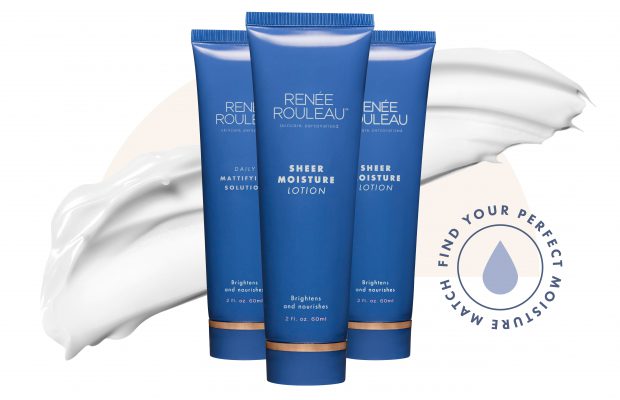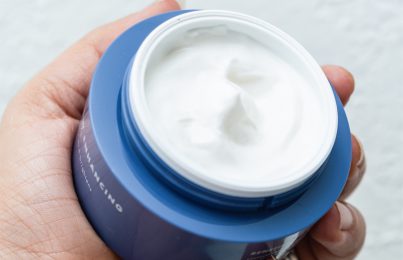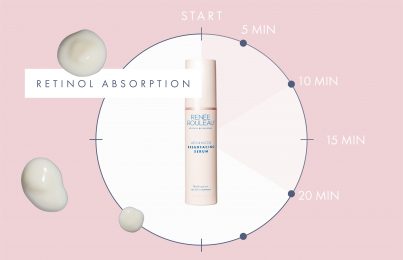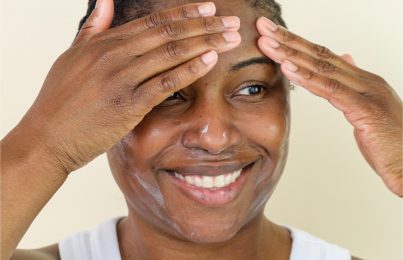Updated 08/08/22. Moisturizer is a basic step in any skincare routine, which explains why some people might take it for granted. Well, I’m here to tell you that there’s a lot more to moisturizer than meets the eye. In this post, I’ll discuss the difference between the various kinds of moisturizers. I’ll also share a few key reasons why you should never skip this product (even if you have oily skin). After reading this, you’ll have everything you need to choose the best moisturizer for your skin type!
- Why Is It Important for Everyone to Use a Moisturizer?
- What Happens If You Don’t Use Moisturizer?
- Moisturizer FAQs
- The Top 5 Moisturizer Mistakes to Avoid
- 1. Not Using Enough SPF Moisturizer on the Neck
- 2. Compensating for Drying Blemish-Focused Products with Heavy Creams
- 3. Waiting More than 60 Seconds to Apply Moisturizer After Cleansing
- 4. Choosing a Moisturizer Because It Claims to Be Anti-Aging
- 5. Using a Moisturizer Just Because It Worked Well for Someone Else
Why Is It Important for Everyone to Use a Moisturizer?
There are a couple of reasons why it’s so important to use a moisturizer regardless of skin type.
Moisturizer Can Improve Skin By Supporting a Healthy Moisture Barrier
There are so many skin conditions—including acne, eczema, psoriasis, rosacea, and dehydration—that can be attributed (at least in part) to a compromised moisture barrier. A healthy moisture barrier is truly a cornerstone of skin health, regardless of skin type. Simply put, this barrier acts as a defense for our skin, keeping essential hydration and nutrients in while keeping potential irritants out. When it’s damaged, it creates tiny, invisible cracks in the skin. This means moisture can escape and irritants can penetrate more easily.
This barrier is made up of protective skin cells, which are held together by lipids (fatty oils). The skin cells are like bricks and the lipids are like the mortar that holds them together, creating a wall that defends your skin against external aggressors. Moisturizers help fortify lipids, which is why they’re a key component in promoting healthy aging. That also explains why moisturizers are so important when you’re trying to repair a damaged moisture barrier.
Moisturizer Can Help Reduce Transepidermal Water Loss
Throughout the day, our skin naturally loses moisture through a process called transepidermal water loss (TEWL). This is when the outermost layer of our skin loses water to the surrounding air via evaporation. In dry environments, this process is accelerated. The water in your skin may evaporate too quickly for your body to replace it, resulting in dehydration. (By the way, dryness and dehydration are two totally different things. Knowing the difference can help you choose the right moisturizer).
It’s important to understand that skin cells are like fish in that they need water to survive. Not every skin type requires extra oil (moisture), but ALL skin types require extra water (hydration). Moisturizer creates a seal over the skin to keep water from escaping, which is essential for helping reduce TEWL and maintaining a healthy moisture barrier.
What Happens If You Don’t Use Moisturizer?
If you skip moisturizer, there are a few things that can happen to your skin, depending on your skin type.
Oily/Combination (Skin Types 1-4)
Sometimes, I see people with breakout-prone skin skip using a moisturizer in order to avoid clogged pores. Ironically, this can have the opposite effect. Let me explain. If your skin becomes dehydrated because you’re not providing it with enough hydration, your skin cells will dry up and die. These dead skin cells can then fall into the lining of your pores, causing a blockage. This blockage may eventually turn into a blemish. Even though it might seem counterintuitive, moisturizer is a must for oily and combination skin types!
Normal (Skin Types 5 & 6)
If your skin falls somewhere between dry and oily, you may think it’s already balanced, so you don’t need to use a moisturizer. As I said before, ALL skin types need hydration. Failing to support your skin’s natural protective functions with moisturizer could actually cause your skin to show visible signs of aging sooner.
Dry (Skin Types 7-9)
If you have a dry skin type, chances are you’re already using moisturizer. This is a good thing. Dry skin naturally produces little to no oil, which means you must compensate by adding both hydration (water) and moisture (oil) to the skin. This will supplement your lipids, which are part of your moisture barrier’s scaffolding.
Don’t know your skin type? Take the Skin Type Quiz to find out.
Moisturizer FAQs
What’s the Difference Between Humectants, Emollients, and Occlusives?
Not all moisturizers work the same way. It’s important to know which one to look for based on your specific skin concerns.
Humectants
This is a class of ingredients that help increase hydration levels by attracting water and drawing it into the skin. Common humectants include sodium hyaluronate, glycerin, propylene glycol, and allantoin. Humectants address dehydration (lack of water) in the skin and can be a good option for those with oily skin types since they tend to be lightweight.
There is one caveat to humectants, though. Since they are always looking to attract water, they’ll start pulling it from the deeper layers of your skin if they can’t find any in the surrounding air. Remember TEWL? When used incorrectly, humectants can accelerate this process because once the water has been pulled up out of the deeper layers of your skin, it can evaporate into the surrounding air. This will actually leave your skin more dehydrated than before. Luckily, the fix for this potential issue is easy. Pair humectants with occlusives, especially if you live in a dry climate. This will create a seal over your skin to keep water in.
Emollients
Emollients are lipid-based ingredients that can fortify and imitate your skin’s natural oils. Remember how your moisture barrier is made up of skin cells, which are held together by lipids? Emollients help fill in any gaps in this barrier to keep it fortified and intact. They ultimately help improve smoothness, softness, hydration, and flexibility within the skin. Examples of common emollients include shea butter, squalane, cetyl alcohol, and jojoba oil. Some emollients can also have occlusive properties.
Occlusives
Occlusives, like plant oils and butter, are designed to create a barrier between your skin and the surrounding air. This is helpful for keeping water in the skin as well as protecting the skin from potential irritants. Occlusives can able be good for protecting damaged skin (dimethicone, a common silicone and occlusive, is sometimes used for wound-healing).
What Does Comedogenic Mean? Do I Need a Moisturizer That’s Non-Comedogenic?
Comedogenic really means “pore-clogging.” The idea is that the less comedogenic an ingredient is, the less likely it is to cause comedones (clogged pores). Unfortunately, there is no standard of measurement for comedogenicity. In fact, the comedogenicity of an ingredient can vary from person to person. An ingredient might also cause breakouts when included in one formula, but not cause breakouts when included in another. It all depends on how the specific ingredient is used. At the end of the day, “comedogenic” is a somewhat outdated term that’s more marketing than anything else. (On that note, learn what common skincare marketing terms really mean).
The reality is that you can’t judge whether or not a moisturizer will agree with your skin based on the ingredient label. For example, if you’re prone to breakouts, you may assume that shea butter and sunflower oil will be greasy and pore-clogging. These assumptions aren’t always valid because results depend on ingredient percentages, and that’s something you’ll never learn from looking at a list on the back of a bottle or jar. (Learn more about skincare ingredient percentages.)
Do I Need an Oil-Free Moisturizer If I Have an Oily Skin Type?
If you have an oily skin type and you see a moisturizer with ingredients that have the word “oil” in them, you might avoid using it. The reality is that it’s not this simple. Just like “comedogenic,” the term “oil-free” is more of a marketing term than anything else. While it can indicate that a moisturizer doesn’t technically use oils, chances are it includes some type of emollient that provides a similar function for the skin (fortifying your lipid barrier and making the product easier to spread across the skin).
With that being said, if a product is labeled “oil-free,” it’s probably been formulated specifically with oily, breakout-prone skin in mind. For this reason, it may be better for those with an oily skin type to use, but it’s not a guarantee. Like I said before, you can’t judge a product by an ingredient label. It ultimately comes down to experimenting to find the right moisturizer.
Do I Need More Than One Moisturizer?
Everyone should have at least two moisturizers. Your daytime moisturizer should include SPF 30 or higher, and your nighttime moisturizer should be sunscreen-free. Don’t worry about looking for something labeled as a “night cream,” as any moisturizer can be used at night so long as it doesn’t include sunscreen. Learn why you should never avoid using moisturizer at night.
Beyond that, using multiple moisturizers could be beneficial if you have a skin condition like eczema that causes dryness or flaking in certain areas. An oil-based moisturizer can aid in the healing process when applied to these areas but may be too thick for other areas of the face that aren’t as dry. Think of this as “spot treating” with moisturizer. Then, of course, you may have to switch up moisturizers to accommodate seasonal changes, depending on where you live.
Do I Need to Use a Serum and a Moisturizer?
It’s important to apply a moisturizer over the serum to seal it into the skin. While most serums will provide some hydration for the skin, their main goal is to deliver active ingredients deep within the skin to help correct certain issues. They don’t provide a protective shield between your skin and the environment like moisturizers do.
The Top 5 Moisturizer Mistakes to Avoid
There are five common moisturizer mistakes that I see people make. Keep scrolling to see what they are and how to correct them.
1. Not Using Enough SPF Moisturizer on the Neck
I’ve seen so many people make this mistake, which is why it comes in at #1! Most people will apply an SPF moisturizer on their face and drag whatever is left down to their neck. However, your neck needs a full and separate application of sunscreen. Check out how much sunscreen you should really be applying.
2. Compensating for Drying Blemish-Focused Products with Heavy Creams
Many blemish-fighting products include ingredients that dry out the skin. I’ve seen many clients react to this by using thick, heavy creams in an effort to bring comfort to their skin. The problem is that they’re giving their skin oil when it doesn’t need it, which could potentially cause even more clogged pores. This isn’t doing them any favors when it comes to eliminating their breakouts. Instead, they should focus on finding a gentle routine that addresses breakouts without stripping the skin. (Learn more about how to get rid of dry skin caused by blemish-focused products).
3. Waiting More than 60 Seconds to Apply Moisturizer After Cleansing
Once you’ve finished washing your face, you have a 60-second window before water starts to evaporate from your skin, causing dehydration. I call this the Golden Minute Rule. To avoid dehydration, apply your toner, serum, and moisturizer quickly after washing your face to seal in hydration.
4. Choosing a Moisturizer Because It Claims to Be Anti-Aging
There are many young people who want to get a head-start on anti-aging skincare. That’s great, but it’s important to know that moisturizers are already anti-aging, even if they don’t say so. By supporting your skin’s moisture barrier and protective functions, you’re already setting yourself up for healthy aging. What’s more, is that many of the anti-aging ingredients commonly found in moisturizers are meant for mature skin and are actually too active for young skin (which is still very metabolically active). This could end up doing more harm than good, so stick with a simple moisturizer that makes your skin feel healthy and moist.
5. Using a Moisturizer Just Because It Worked Well for Someone Else
Just because a product worked for your friend doesn’t necessarily mean it will work for you, even if you have similar skin types! It’s best to find a moisturizer that’s formulated specifically for your skin. After all, finding the right one for your skin type is crucial in achieving your specific skin goals. If you’re in need of specific product recommendations, I suggest taking the Skin Type Quiz and/or consulting a trusted skincare expert.
Next, learn five skincare mistakes that could be making your sunscreen less effective!
Celebrity Esthetician & Skincare Expert
As an esthetician trained in cosmetic chemistry, Renée Rouleau has spent 30 years researching skin, educating her audience, and building an award-winning line of products. Her hands-on experience as an esthetician and trusted skin care expert has created a real-world solution — products that are formulated for nine different types of skin so your face will get exactly what it needs to look and feel its best. Trusted by celebrities, editors, bloggers, and skincare obsessives around the globe, her vast real-world knowledge and constant research are why Marie Claire calls her “the most passionate skin practitioner we know.”



